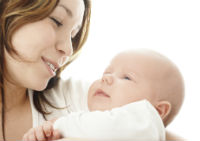Postpartum Changes to Expect after Baby Arrives
After carrying baby for nine months and then going through labor, your body will not go back to its pre-pregnancy self overnight. Do not be surprised if you experience these postpartum changes in the weeks after giving birth.
Leaking Urine
It’s normal to leak a few drops of urine when you cough, sneeze or laugh. This “stress incontinence” is a temporary nuisance that occurs while your bladder and pelvic organs are rearranging themselves back to their pre-pregnancy positions. Wear a sanitary pad for a few weeks until this annoyance subsides.
Profuse Sweating
Another of the postpartum changes you can expect as your body gets rid of the excess fluids accumulated during your pregnancy is increased perspiration, especially at night. For the first night or two wear cotton clothing to absorb the perspiration and cover your sheet and pillow with a towel to absorb the night sweats. Excessive sweating is most prominent during the first week and gradually subsides by the end of the first month.
Painful Postpartum Changes
Your sensitive perineum has been stretched to the limit and it may possibly have been bruised or torn. If it has been cut into, it’s bound to smart. Ask the nurse to instruct you on “peri-care.” Heat increases blood flow and promotes healing; cold numbs pain and decreases swelling. Both measures are necessary to heal a traumatized perineum. The nurse will tuck an ice pack up against your perineum as soon as possible (it will feel so good). She will advise you about soaking in a warm bath and show you how to squirt warm or cool water over your perineum, using a “peri-bottle.” Try using cool witch hazel pads between your perineum and the sanitary pad.
Constipation
Your bowels may be as reluctant to work as your bladder is, and for similar reasons. The muscles involved in passing a stool may have been traumatized during passage of the baby. Drugs and anesthetics temporarily cause the intestines to be a bit sluggish, and your bowels were probably emptied naturally by the normal “diarrhea” that normally precedes birth. Besides these physical causes for problems with bowel movements, many mothers have a psychological reluctance to do any pushing with their perineal muscles, either for fear of hurting these tissues or because of a desire to rest them. Yet the sooner you get your intestines moving, the better you will feel.
Gas and Bloating
The bowel sluggishness that contributes to constipation also may make you feel gassy, especially if you are recovering from a cesarean section. Drinking and eating frequently, but in smaller amounts, and getting your body moving again will ease these uncomfortable postpartum changes.

